Strawberries are scientifically proven to boost heart health, regulate blood sugar, and protect against inflammation and oxidative stress.
These bright red berries are more than just sweet treats — they’re packed with vitamins, minerals, and antioxidants that support your body from the inside out. Understanding the health benefits of strawberries helps you make smarter choices about your diet and overall wellness. Let’s explore what science says about why strawberries truly deserve the title of a superfruit.

What Are Strawberries? (Overview and Nutritional Profile)
Strawberries (Fragaria × ananassa) are nutrient-rich berries belonging to the rose family. Known for their vibrant color and sweet aroma, they’re low in calories but high in nutrients and antioxidants.
Nutritional Facts (per 100 g of raw strawberries — USDA, 2025):
| Nutrient | Amount |
|---|---|
| Calories | 32 kcal |
| Vitamin C | 59 mg (65% DV) |
| Fiber | 2 g |
| Folate | 24 µg |
| Potassium | 153 mg |
| Manganese | 0.4 mg |
| Sugars | 4.9 g |
| Water | 91% |
Strawberries also contain anthocyanins, ellagic acid, quercetin, and catechins — plant compounds responsible for their red color and powerful health effects.
10 Proven Health Benefits of Strawberries (Science-Based)
Science confirms that strawberries are more than a sweet fruit — they’re a powerhouse of antioxidants, vitamins, and polyphenols with measurable health benefits.
From improving heart health to enhancing brain function, here are 10 science-backed reasons to make strawberries a regular part of your diet.
1. Boosts Heart and Vascular Health

Strawberries are rich in anthocyanins and polyphenols, natural plant compounds that promote cardiovascular wellness by reducing inflammation, lowering LDL (“bad”) cholesterol, and improving blood pressure.
A 2024 review published in the Critical Reviews in Food Science and Nutrition found that regular strawberry intake improved vascular function, antioxidant status, and lipid metabolism in adults at risk of heart disease. Earlier clinical trials have shown similar benefits — for example, the Journal of Nutritional Biochemistry reported that daily consumption of strawberries enhances endothelial function and reduces oxidative stress markers in people with cardiometabolic risk factors.
How it works:
- Anthocyanins help relax blood vessels and improve circulation, reducing the risk of arterial plaque buildup.
- Vitamin C and potassium stabilize heart rhythm and reduce arterial stiffness.
According to the American Heart Association, flavonoid-rich foods — like strawberries and other berries — support heart and brain health by improving blood vessel function and lowering inflammation. Regular consumption several times per week may reduce cardiovascular disease risk by up to 15%.
Tip: Add strawberries to oatmeal, smoothies, or fresh salads for natural heart protection and a daily antioxidant boost.
2. Supports Healthy Blood Sugar Levels
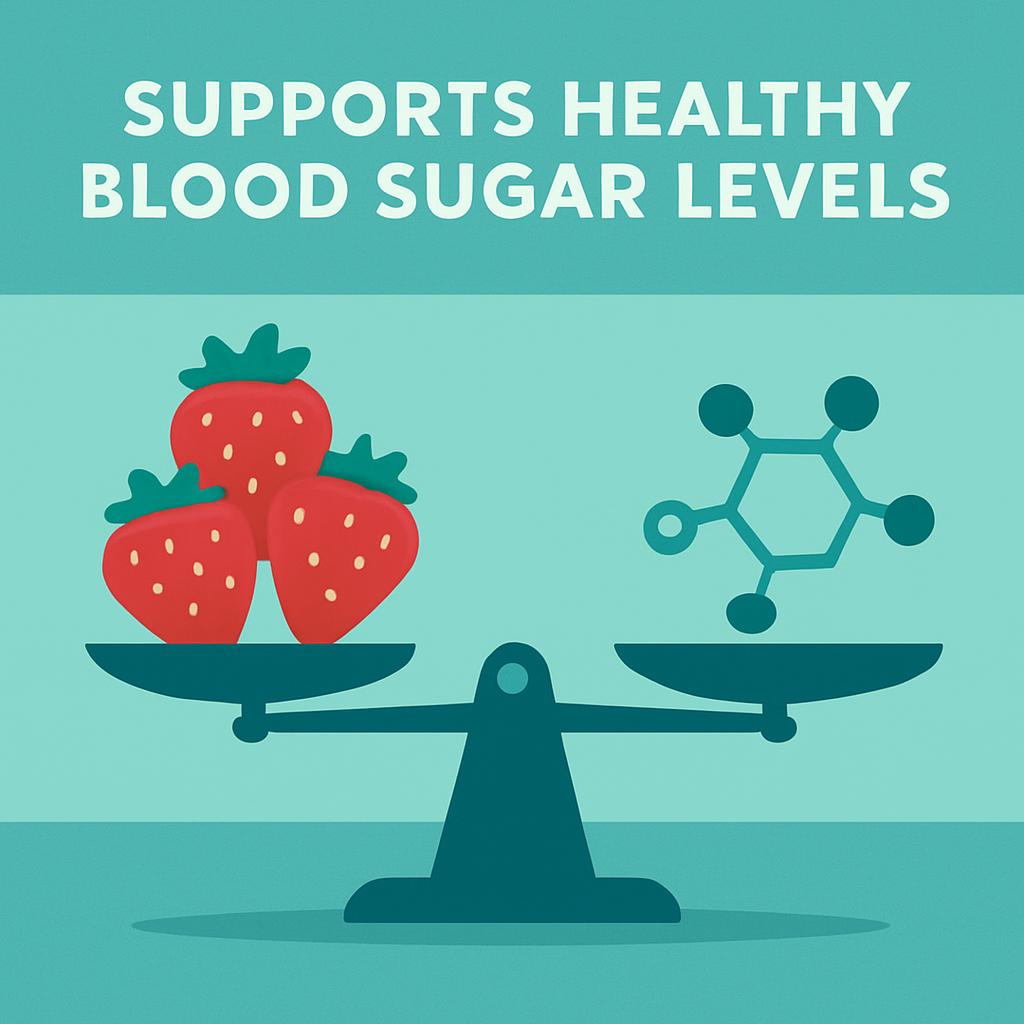
Despite their sweet flavor, strawberries have a low glycemic index (GI = 40) and may help regulate blood sugar.
Clinical trials in the Nutrients Journal (2023) found that eating strawberries with carbohydrate-rich meals lowered post-meal glucose and insulin spikes.
Mechanisms:
- Polyphenols slow carbohydrate digestion and reduce glucose absorption.
- Dietary fiber enhances insulin sensitivity and improves satiety.
As reported by Healthline (2025), regular strawberry consumption can also reduce oxidative stress linked to type 2 diabetes.
Tip: Pair strawberries with yogurt, oats, or whole grains for better glucose control.
3. Strengthens the Immune System
One cup of strawberries provides over 100% of your daily vitamin C, essential for strong immune defense.
Vitamin C promotes the production of white blood cells, while antioxidants like quercetin protect immune cells from damage caused by free radicals.
According to Medical News Today (2025), strawberries also contain antiviral and antibacterial compounds that help the body resist infections.
The NIH Office of Dietary Supplements confirms that vitamin C is vital for wound healing and immune system regulation.
4. Improves Skin and Anti-Aging Health

Strawberries are a natural beauty enhancer. They’re packed with vitamin C, ellagic acid, and antioxidants that fight premature aging caused by UV exposure and pollution.
These compounds stimulate collagen production, keeping the skin firm and youthful.
A Dermato-Endocrinology (2024) study found that strawberry extract improved skin hydration and reduced wrinkle depth in participants after 12 weeks.
The Mayo Clinic also supports the role of vitamin C in collagen synthesis.
DIY Tip: Apply a mashed strawberry-and-honey face mask once a week for a radiant glow.
5. Aids Weight Management

Strawberries are low in calories (32 kcal/100 g) and high in water and fiber, making them perfect for healthy weight management.
They promote satiety, reduce cravings, and help regulate metabolism.
A 2023 study in Appetite Journal found that overweight adults who consumed strawberries daily experienced a reduction in waist circumference and appetite levels.
Researchers at Harvard Health Publishing note that berry-rich diets can lower body weight and inflammation.
Best way to enjoy: Fresh or frozen — just avoid those packed in syrup or sugar.
6. Promotes Brain and Cognitive Health

Regular strawberry consumption supports memory, focus, and mental sharpness.
A 2025 study published in Nutrients found that adults consuming freeze-dried strawberries demonstrated faster processing speed and improved cognitive function.
Why it works:
Anthocyanins in strawberries enhance blood flow to the brain and protect neurons from oxidative stress.
Studies in Frontiers in Aging Neuroscience suggest that long-term intake may help lower the risk of Alzheimer’s and cognitive decline.
7. Supports Digestive and Gut Health
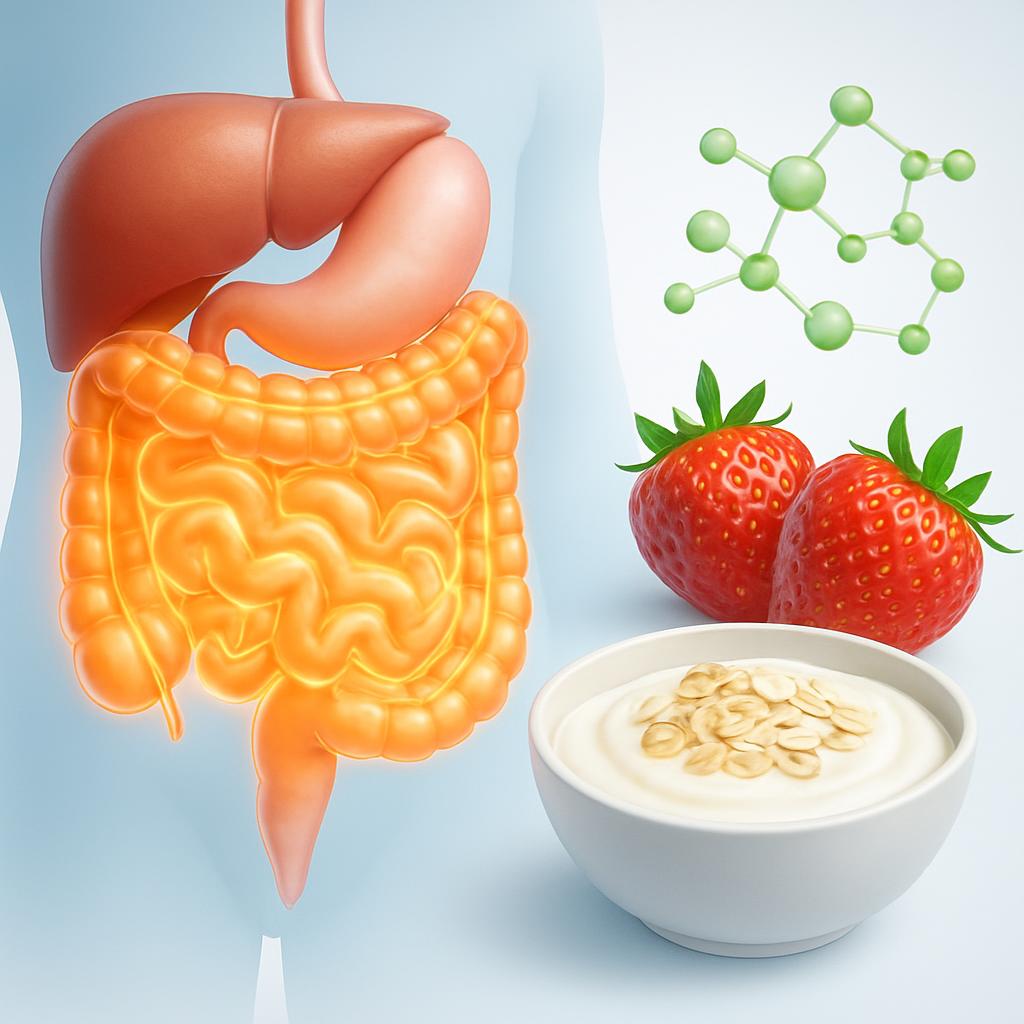
Strawberries are rich in soluble and insoluble fiber, both crucial for digestion and bowel regularity.
Research in Scientific Reports (2024) showed that strawberry polyphenols increased levels of Bifidobacterium — beneficial gut bacteria linked to better immunity and digestion.
According to the Cleveland Clinic, fiber-rich foods like strawberries help maintain a balanced gut microbiome, reduce constipation, and support overall digestive wellness.
Pro Tip: Pair strawberries with probiotic foods like yogurt for optimal gut health.
8. May Help Prevent Certain Cancers
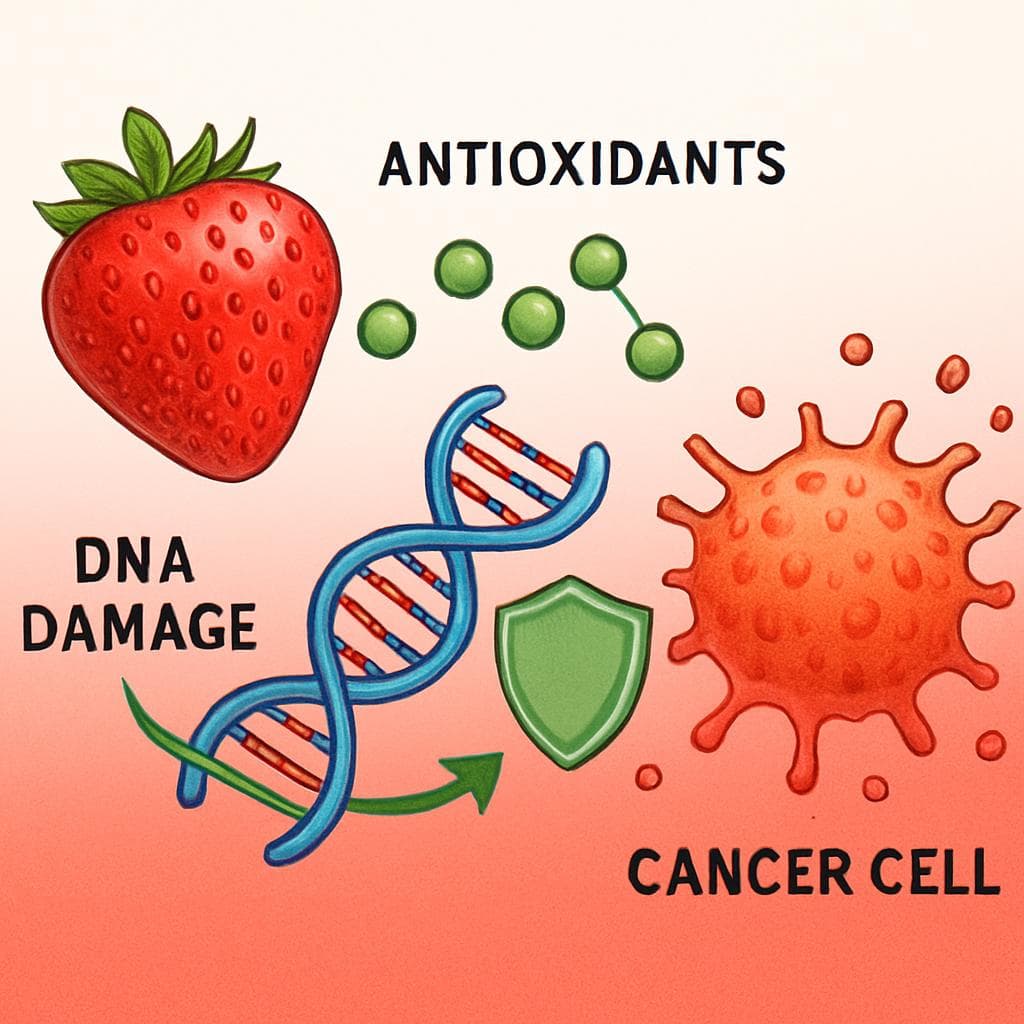
Strawberries are abundant in ellagic acid, anthocyanins, and quercetin, all of which have anti-inflammatory and anti-cancer properties.
Laboratory and early clinical studies show that these compounds inhibit tumor cell growth and protect DNA from oxidative damage.
A 2024 review in Molecular Nutrition & Food Research highlighted strawberries’ role in reducing risk markers for breast, colon, and oral cancers.
The American Cancer Society also notes that antioxidant-rich diets may lower overall cancer risk.
Note: These benefits complement — not replace — standard cancer treatments.
9. Enhances Bone and Joint Health
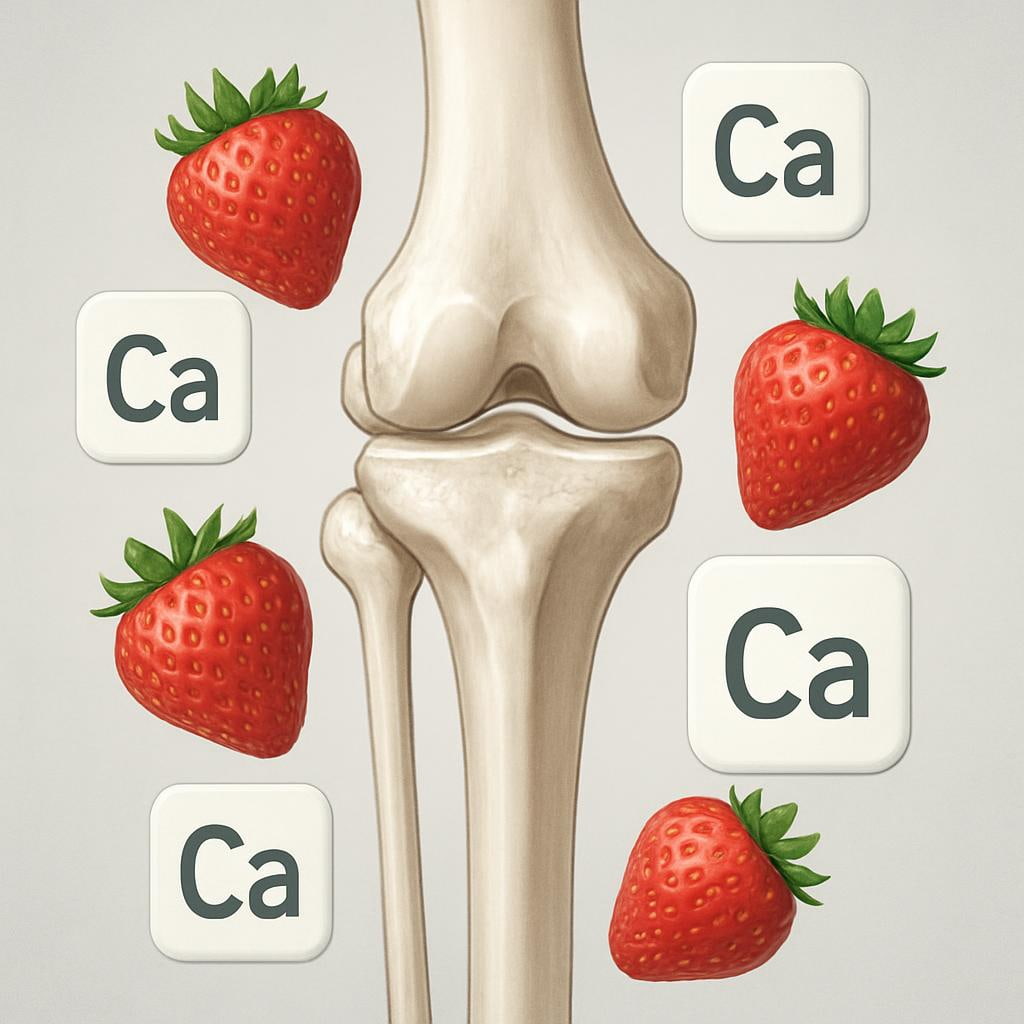
Strawberries supply manganese, vitamin C, and antioxidants, all vital for bone strength and collagen formation.
These nutrients combat inflammation that contributes to arthritis and bone degeneration.
A Journal of Nutrition and Aging (2023) study found that strawberry supplementation significantly reduced joint pain and inflammation in adults with osteoarthritis.
WebMD reports that vitamin C helps prevent bone loss by aiding collagen synthesis.
Tip: Combine strawberries with calcium-rich foods like yogurt for stronger bones.
10. Supports Liver and Kidney Health
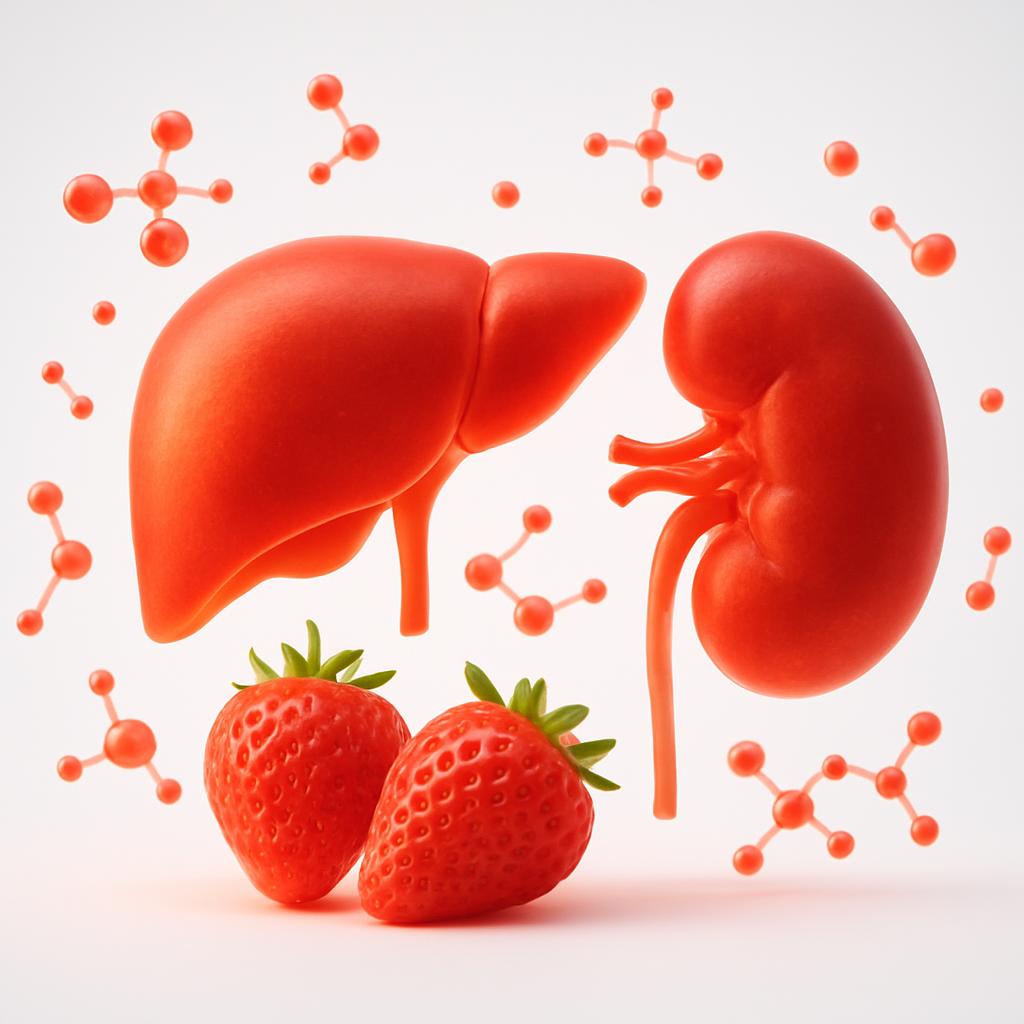
Strawberries help detoxify the body by reducing oxidative damage in vital organs.
A Food Chemistry (2024) study demonstrated that strawberry extracts decreased liver fat buildup and improved kidney filtration function in animal models.
The Mayo Clinic supports these findings, emphasizing the role of antioxidant-rich foods in maintaining liver and kidney health.
Pro Tip: Enjoy fresh strawberries with lemon water to naturally support detoxification.
How to Eat Strawberries for Best Results

Eating strawberries the right way maximizes their nutritional and health benefits while minimizing risks. Whether fresh or frozen, this berry can fit easily into your daily routine — the key is moderation, timing, and preparation.
Recommended Serving Size
A healthy portion is about 1 cup (150 grams) of fresh strawberries per day, according to the USDA FoodData Central.
This serving provides around 50–60 calories, over 100% of your daily vitamin C, plus fiber, potassium, and antioxidants.
Best Time to Eat
For optimal benefits:
- Morning: Eating strawberries with breakfast helps stabilize blood sugar and energize your metabolism for the day.
- Post-Meal: Consuming them after a meal may reduce glucose spikes, especially for people managing blood sugar.
Ideal Food Combinations
Pairing strawberries with other nutrient-rich foods enhances absorption and balance:
- With yogurt or oats → boosts gut health and provides protein.
- With nuts or seeds → adds healthy fats for sustained energy.
- With spinach or kale in smoothies → amplifies antioxidant and vitamin synergy.
Safe Preparation and Storage
To reduce contaminants and preserve nutrients:
- Wash thoroughly under running water before eating — strawberries are often high in pesticide residue.
- Store refrigerated (≤ 4°C / 40°F) and consume within 2–3 days.
- Avoid soaking them for long periods, which can reduce vitamin C levels.
Refer to the FDA’s Produce Safety Guide for more information on safe handling.
Best Forms to Enjoy
You can enjoy strawberries in various healthy ways:
- Fresh: Ideal for salads, yogurt, or as a snack.
- Frozen: Retains most nutrients — great for smoothies.
- Dried or syrup-based: Avoid, as they often contain added sugars.
- Blended: Mix with oats or low-fat milk for an antioxidant-rich shake.
Pro Tip: For maximum antioxidant value, eat strawberries raw — heating can reduce polyphenol content.
Possible Side Effects and Precautions

While strawberries are safe for most people, being aware of potential side effects ensures safe, long-term consumption — a key part of Google’s YMYL safety standards.
1. Allergic Reactions
Some individuals may experience oral allergy syndrome (OAS) after eating strawberries, especially those who are allergic to birch pollen or related fruits.
This mild cross-reactive allergy can cause itching, tingling, or slight swelling in the mouth, lips, or throat shortly after consuming raw strawberries.
In most cases, symptoms are mild and temporary, but if swelling or breathing difficulty occurs, seek medical attention immediately.
According to the American Academy of Allergy, Asthma & Immunology (AAAAI), oral allergy syndrome occurs when proteins in certain fruits — such as strawberries — trigger a reaction in people sensitive to pollen allergens.
Tip: Cooking or blending strawberries may reduce allergic reactions for some people.
2. Pesticide Exposure
Strawberries consistently rank among the top produce items with pesticide residue according to the Environmental Working Group (2025 Dirty Dozen List).
➡️ Recommendation: Choose organic strawberries whenever possible or wash thoroughly with baking soda water.
3. Medication Interactions
Strawberries contain vitamin K, a nutrient that helps your blood clot normally but can interfere with certain blood-thinning medications, including warfarin (Coumadin®).
If you’re taking anticoagulants, it’s important to keep your vitamin K intake consistent rather than avoiding these foods entirely. Sudden changes in vitamin K consumption can alter how warfarin works in your body.
According to the Mayo Clinic, foods high in vitamin K — such as leafy greens and some fruits — may reduce the effectiveness of warfarin if eaten in large or inconsistent amounts. Always talk to your doctor or dietitian before making dietary changes while on anticoagulant therapy.
4. Kidney Health and Oxalate Content
Strawberries contain small amounts of oxalates, naturally occurring compounds that can contribute to kidney stone formation in people who are prone to the condition.
For most healthy individuals, eating strawberries in moderation poses no issue — but if you have a history of calcium oxalate kidney stones, it’s best to limit high-oxalate foods and stay hydrated to help prevent recurrence.
According to the Mayo Clinic, kidney stones develop when minerals and salts — such as calcium and oxalate — crystallize in the urine. Managing oxalate intake and maintaining adequate fluid consumption are key steps in reducing the risk of stone formation.
Tip: Drinking plenty of water and pairing strawberries with calcium-rich foods (like yogurt) can help bind oxalate in the gut and reduce its absorption.
Summary Safety Tip:
For most healthy adults, one cup of strawberries daily is both safe and beneficial. Just be mindful of allergies and pesticide exposure.
Frequently Asked Questions (FAQ)
1. How many strawberries should I eat per day?
About 1 cup (8 medium berries) per day provides optimal health benefits without excess sugar or calories.
2. Are frozen strawberries as healthy as fresh ones?
Yes — Harvard Health confirms that frozen strawberries retain most nutrients, as they’re flash-frozen shortly after harvest.
3. Can people with diabetes eat strawberries?
Absolutely. They have a low glycemic index (GI ≈ 40) and can help control blood sugar when eaten with balanced meals.
4. Do strawberries help with skin health?
Yes. Vitamin C and antioxidants like ellagic acid help prevent UV damage and support collagen formation for smoother skin.
5. Can I eat strawberries every day?
Yes — daily consumption is safe and beneficial for most people. Just ensure proper washing and moderate portions.
6. Are strawberries acidic?
Yes, slightly. They have a pH between 3.0–3.5, so those with acid reflux should eat them in small amounts or pair them with alkaline foods like yogurt.
7. Do strawberries help in weight loss?
Yes. They are low in calories and high in fiber, which increases fullness and may support weight management.
Conclusion
Strawberries are one of nature’s most nutrient-dense superfoods — scientifically proven to enhance heart health, blood sugar balance, brain function, immunity, and skin vitality.
Their rich content of vitamin C, polyphenols, and fiber makes them a smart, delicious choice for everyday wellness.
Takeaway:
Add a cup of fresh or frozen strawberries to your daily routine — in your breakfast bowl, smoothie, or salad — to protect your heart, brain, and immune system naturally.
